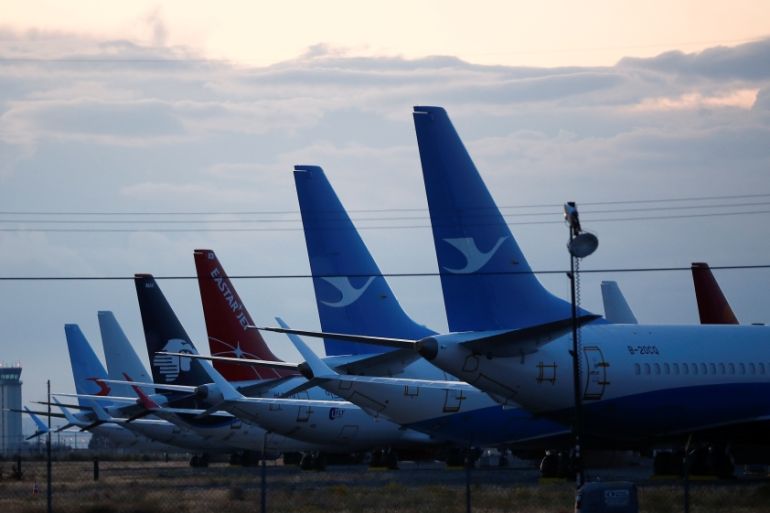Boeing’s internal 737 MAX messages: Employees may have misled FAA
Company communications from 2016 show the firm might not have been fully truthful with United States aviation regulator.

The Boeing Company turned over instant messages exchanged between two employees in 2016 that suggest the airplane maker may have misled the United States Federal Aviation Administration (FAA) about a key safety system on the grounded 737 MAX, sources briefed on the matter told the Reuters News Agency.
The FAA confirmed on Friday that Boeing told the US government aviation regulator a day earlier about internal messages that the company had discovered “some months ago” and that characterise “certain communications with the FAA during the original certification of the 737 MAX in 2016”.
Keep reading
list of 4 itemsMore than 11,000 evacuated in northern Indonesia as volcano erupts
Jordan, Lebanon, Iraq reopen airspace closed over Iran’s attacks on Israel
Australian women lose bid to sue Qatar Airways over 2020 strip searches
Saying that it found the messages concerning, the FAA noted it will be “reviewing this information to determine what action is appropriate”.
A letter from FAA Administrator Steve Dickson to Boeing Chief Executive Dennis Muilenburg demanded an “immediate” explanation for the delay in turning over the documents.
Sources told Reuters the Boeing internal messages raised questions about the performance of Maneuvering Characteristics Augmentation System (MCAS) anti-stall software that has been tied to two fatal MAX 737 crashes in a five-month period.
The messages are between the MAX’s then-chief technical pilot, Mark Forkner, and another Boeing pilot, the sources said, and raised questions about the MCAS’s performance in the simulator. Forkner has since left Boeing. Neither he nor his lawyer responded to requests for comment.
‘I basically lied’
Boeing said in a statement that the company had brought to investigators’ attention “a document containing statements by a former Boeing employee”.
A person briefed on the matter said that Boeing failed to turn over the documents to the FAA for four months and that the US Department of Justice is also in possession of the messages.
The Seattle Times reported in September that Forkner repeatedly invoked his Fifth Amendment right to not turn over documents subpoenaed by the justice department.
Forkner said in one text message, “I basically lied to the regulators (unknowingly)”. The other employee responded that “it wasn’t a lie, no one told us that was the case” in regard to the MCAS issue.
Forkner responded soon afterwards with: “Granted I suck at flying, but even this was egregious”.
In the exchange, Forkner said he was writing while “drinking icy cold grey goose”. At one point Forkner said “there are still some real fundamental issues” in the simulator.
The messages appear to be the first publicly known observations that MCAS behaved erratically during testing before the aircraft entered service.
The FAA plans to turn over more communications from Forkner to the US Congress later on Friday, sources said.
‘Will lift the grounding’
Federal prosecutors – aided by the FBI, several blue-ribbon panels and the US Department of Transportation’s inspector general – are investigating the 737 MAX’s certification.
Boeing is currently revising the 737 MAX software to add more safeguards and require the MCAS system to receive input from two key sensors.
The FAA reiterated that it is “following a thorough process, not a prescribed timeline, for returning the Boeing 737 MAX to passenger service. The agency will lift the grounding order only after we have determined the aircraft is safe.”
Earlier this week, Southwest Airlines Company delayed the return of the plane to its schedule until February.
Separately, the US Senate Committee on Commerce, Science and Transportation confirmed it will question Muilenburg at an October 29 hearing, one day before a US House of Representatives panel is scheduled to question him.
Boeing shares fell more than six percent after the Reuters report was published, helping to drag down the Dow Jones Industrial Average to a session low.